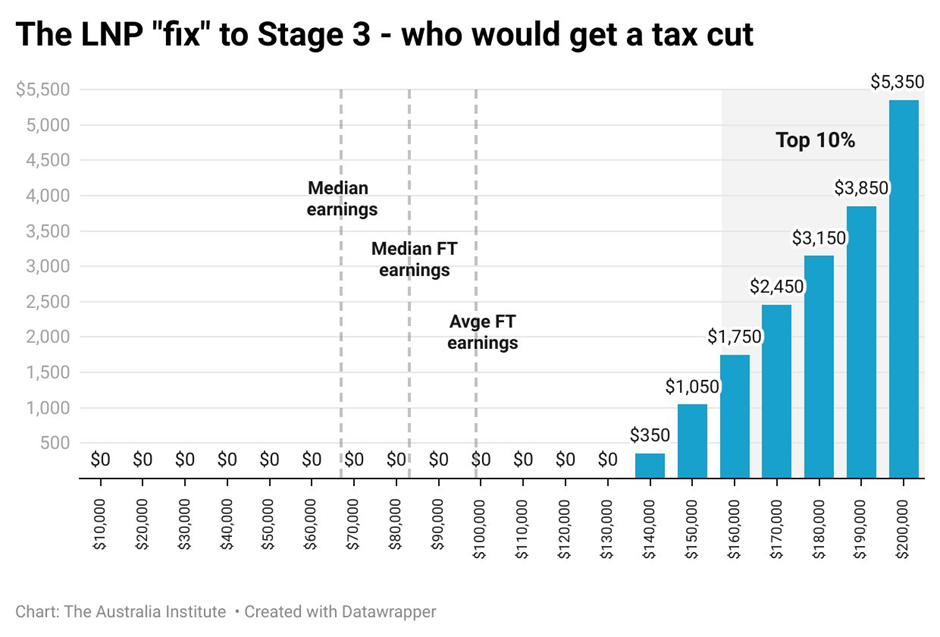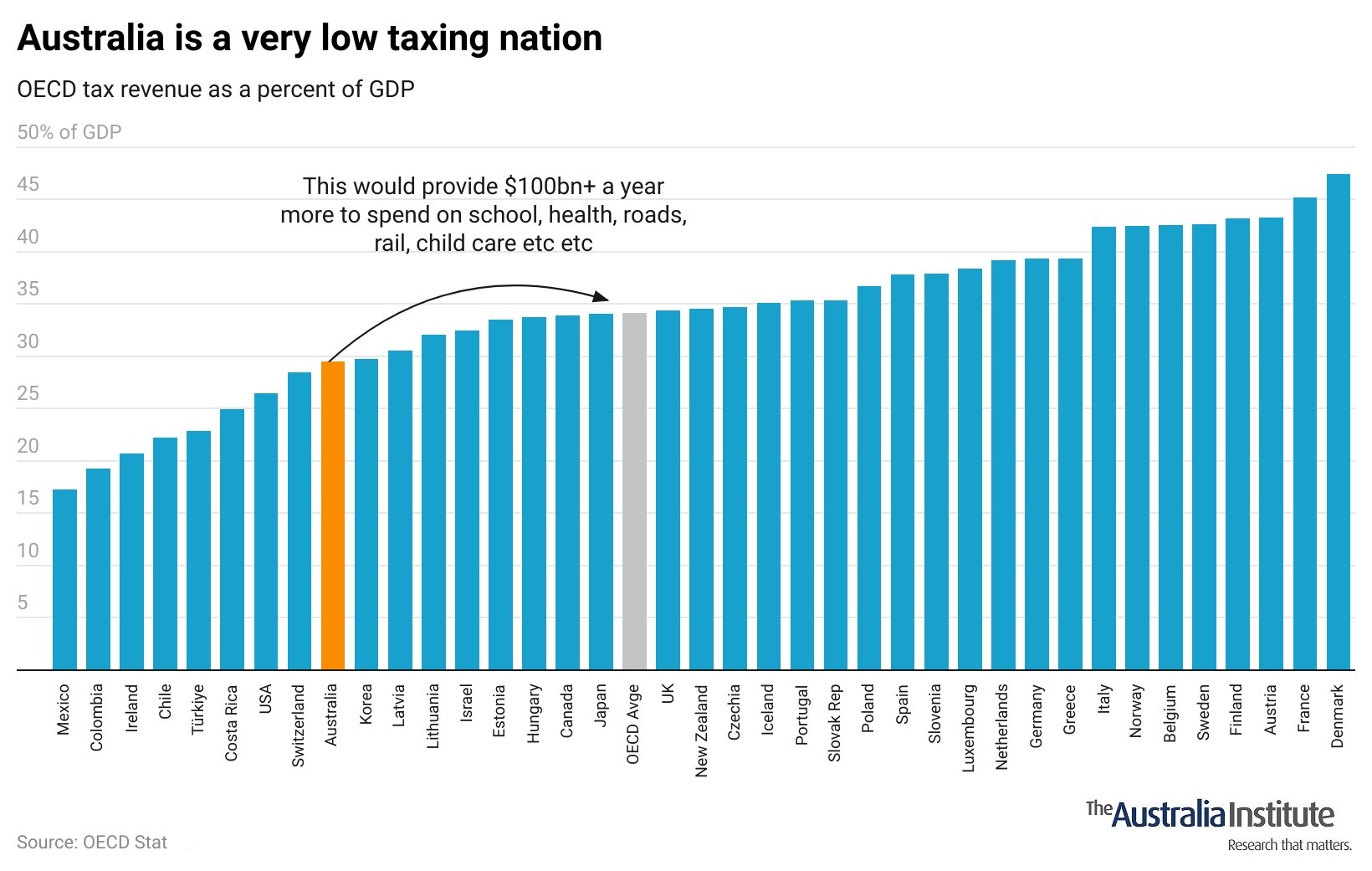The Albanese ALP Government’s revision of the Morrison Government’s Stage 3 Tax cuts ensures one thing in the lead up to the next election, and that is talk of tax reform.
Rightly so, as Australia is screaming for it.
The surreal thing is it seems to have caught both sides of mainstream politics on the hop. Australia is at the very end of an era of incremental neoliberal policy, which has driven the national economy onto the rocks of uncompetitiveness, with one of the OECD’s most indebted and casualised workforces.
That is underpinned by resources exports of fossil fuels (gas and coal) or reliant on fossil fuel use by a single buyer who is looking for cheaper supply (iron ore and China), for which prices are eyeing the downhill slope following a once-in-a-generation boom.
The whole box and dice has become taxation of people rather than economic endeavour. It may be the only real ‘shortage of people’ Australia has.
We have a policy ordained desperation for taxation reform.
The SMH reports former ACTU Chief, Bill Kelty going to the nub of the issue.
Anyone under 50 is likely to be taken to the cleaners by the current taxation system.
That divides society into haves and have-nots.
“But Kelty, the former ACTU secretary who worked closely with Bob Hawke and Paul Keating on economic reform, argued the tax system needed to be transformed to avoid a generation of falling living standards and an unjust society for younger Australians.
Praising Labor’s stage 3 changes for the help they gave low- and middle-income earners, Kelty said some young people were paying an effective marginal tax rate of more than 50 per cent when factoring in university fees, GST and private health insurance.
The government should freeze university fee debts and shift towards taxing assets rather than income, Kelty urged, describing the existing settings as “grossly unfair” for younger people and risking a fracturing of Australia’s middle class based on whether a person owned a home.
“Is that what we say to half the workforce, half the society, half of the young people: ‘Well that’s OK, your problem is you didn’t have rich enough parents [to afford a home]’?” he said, adding that income tax rates in the high 30s and above were too high.
“I don’t think that’s a good society. I think it’s an awful society.”
By consistently siding with “rich older people”, whose numbers are dwindling, Kelty said the Liberal Party could be “destroyed” as a viable party of government.”
For the LNP’s future, Peter Dutton is holding off on saying what he will or won’t do with the government’s legislation to revise the Stage 3 cuts bequeathed to it by Scott Morrison’s government.
Somewhere, a light has come on. With a couple of by-elections coming up, selling the original Morrison – Frydenberg tax vision is tough.
This is why:

As Michelle Grattan notes over at the Conversation, if Dutton is to stand any chance of ever being elected PM, then holding off on infuriating about 70% of the electorate is essential.
“An immediate problem for the “liar” campaign is that people are more forgiving when a broken promise benefits them. This one advantages the majority of taxpayers. Even those disadvantaged are still getting a tax cut, just a smaller one than they anticipated. If the broken promise had removed an established benefit it would be a different story.
The expectation is the Coalition will reluctantly wave the package through. Apart from the byelection, the message from some of its backbenchers in poorer electorates is people want the money.”
This weekend, every woman and man and their dog is talking about tax reform. The Saturday Paper, the Australian, the AFR, and the Mandarin, amongst others.
And it isn’t as though there is not plenty to talk about. Regardless of what we may think about Teal MP, Allegra Spender or Australia Institute Economist Richard Denniss on other issues, we should thank them for making the case again in the last week. There is no doubt she was speaking with genuine concern on the intergenerational drivers for tax reform.
“A young man came to see me recently and said, ‘I feel like I’ve done everything right. I’ve studied hard, finished uni, I’ve got a good job, a $50,000 HECS debt, and I can’t see how I can create the life my parents had’,” said Spender.
“I think we are seeing the emergence of an intergenerational tragedy. Sydney, where I’m from, has the second-least affordable housing in the world.
“We want to be a country that encourages innovation, creativity, and entrepreneurialism — a place where every person can boldly bring their best talents to their community and the world.”
Denniss made valid points about the fundamentals of Australian taxation – the level of taxation in the economy and what is taxed.
His point about the idiocy of taxing Australians more through their HECS debts than we tax foreign multinationals exploiting the resource endowment, which is virtually our sole source of offshore earnings, should be carved in stone above the entrance to Parliament House.
Australia is a low-tax country compared to OECD averages. While Denniss agreed that personal income tax made up too great a portion of government revenue, he thinks it’s an argument for expanding Australia’s tax base.
“If we were to collect the average amount of tax collected by OECD countries, then this year we would have collected an extra $100 billion in tax,” he said.
“Instead of collecting an extra hundred billion dollars a year and spending it on the services and infrastructure that Australians so desperately need, we’re going to cut taxes by $20 billion.
“Australian personal income taxes are not the highest in the world and they’re not even high … We don’t over-rely on income tax. We under-rely, we under collect on taxes on pollution and taxes on wealth”

The AFR rightly notes that the disintegrating credibility of Australian politicians from both mainstream sides brought taxation reform to a halt more than a generation ago, with little other than tinkering in the years since.
The biggest challenge facing the decades-overdue systemic reform of Australia’s dysfunctional taxation system is removing the obstacles to change.
Those obstacles are the creations of the Labor Party and the Coalition. Both major political groupings have for decades abused, complicated, disabled and undermined our taxation system for political gain.
They have denied any significant tax reform since the GST – itself an initiative that took decades from Paul Keating’s first citation in 1982 to John Howard dragging it across the finish line in 2000.
Instead, they have tweaked here and there, seeking political advantage – to our cost.
Who hasn’t linked Labor’s amendment of the stage three cuts to a cynical effort to bolster chances in a forthcoming by-election?
Are the amendments good? They’re not bad but, left as they are, will only contribute further to the stand-out problem with our tax system: over-reliance on income taxes, personal and corporate.
Our political leaders know the system is crippled. But woe betide anyone foolish or idealistic enough to address the problems openly. As Labor learned at the 2019 election, the opposition will chop them down.
That political pusillanimity has Australia preparing for the future with a taxation system equivalent to an old Kingswood with a generation on the clock.
Taxing people over assets makes no sense for a nation that remains almost solely a commodity and resource supplier to the rest of the world.
Miners are radically undertaxed. The gas cartel isn’t taxed at all. There is negative gearing and capital gains tax concessions. Concessions for residences and rents, superannuation contributions, trusts etc. Almost every small business in the country is an exercise in tax farming at one level or another.
Taxation is what funds government services. As a nation, we need to recognise that if we are providing a taxation concession to a business, we are making that business into a service provided by the Government.
In the case of housing and negative gearing, it has failed. A similar case can be made for private health insurance and other concessions. It is time these were examined for benefit to Australia.
We have less than 18 months until the next Federal election. Albo has brought on the discussion, and the same wedge which has worked against the Australian people for a generation now means our polity can’t avoid having the discussion.
The Henry Tax Review covered all of these issues. Time to dust it off and bring on the debate.